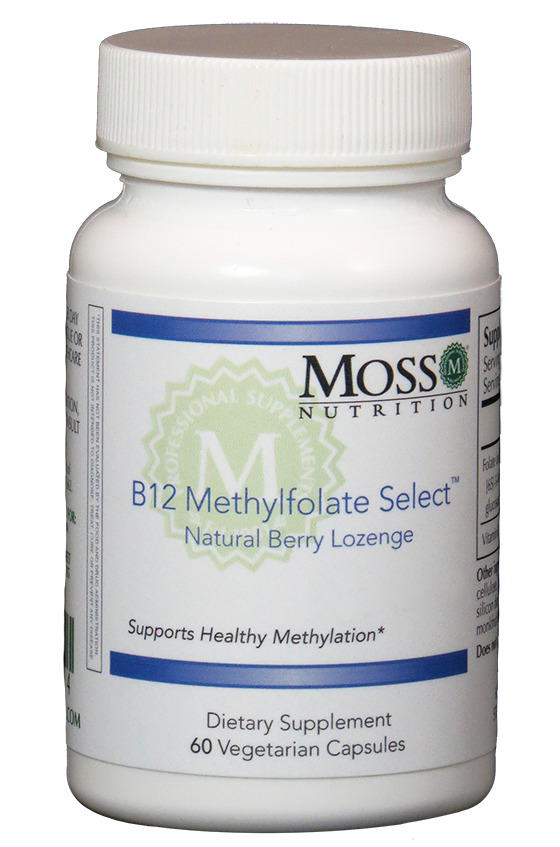Infection Connection

Vitamin B12 Assessment and Management
Vitamin B12 Form
Cyanocobalamin has no known biochemical function. It must be converted to become active. It gets converted for use into hydroxocobalamin, methylcobalamin, or adenosylcobalamin. These three forms are equal in bioavailability.
An exception to this is for the use of adenosylcobalamin in infants with a rare inborn error of synthesis.
Methylcobalamin and adenosylcobalamin are coenzyme forms of B12.
Hydroxocobalamin can be converted into the above two forms.
Click here to learn more about the Hedberg Institute Membership.
 Vitamin B12
Vitamin B12Function
Vitamin B12 is used for DNA synthesis, homocysteine metabolism, S-adenosylmethionine, red blood cell formation, nervous system and immune system function.
Vitamin B 12 is necessary for folate to be metabolized properly into Methionine and Succinyl-CoA.
Low levels of B12 and increased levels of folate are associated with higher concentrations of methylmalonic acid (MMA) and total plasma homocysteine (HCY).
Vitamin B12 Sources
The average American diet contains adequate amounts of vitamins B12, ranging from 5-15 mcg/day. Meat, poultry, fish, eggs, and dairy, constitute the primary food sources.
It is not found in most non-animal food sources. Individuals consuming a plant-based diet are at an increased risk of deficiency. Non-meat food sources such as chlorella, spirulina, nori, and fermented soy contain mostly B12 analogues which have no activity in humans. Fifty-one percent of those following a macrobiotic diet were found to be deficient.
Vegan Diets 0.3-0.4 mcg/day
Lacto-vegetarians 1.4 mcg/day
Recommended Dietary Allowances (RDA)
Males >14 years: 2.4 mcg/day
Females >14 years: 2.4 mcg/day
Pregnancy: 2.6 mcg
Lactation: 2.8 mcg
Absorption of B12
Pepsin and hydrochloric acid (HCL) are necessary for cleaving B12 from protein in stomach.
Individuals with low levels are at a greater risk of deficiency due to decreased break down for absorption.
B12 supplements (crystalline B12) do not require HCL or pepsin to bind to intrinsic factor (IF).
B12 supplements are absorbed normally in hypochlorhydria.
Intrinsic factor (IF) is made in the stomach and necessary for carrying B12 from the stomach to intestines for absorption.
Individuals with genetic SNPs impairing intrinsic factor (IF) production are also at a greater risk of deficiency and must rely on B12 injections, bypassing the need for IF.
IF becomes fully saturated at 2 mcg of B12.
Large doses can be absorbed through passive diffusion which doesn’t require IF. This accounts for 1-2% of absorption.
1000 mcg/day can overcome loss of IF due to pernicious anemia.
Pernicious anemia is an autoimmune disease characterized by the destruction of parietal cells which produce IF.
Possible Causes of Vitamin B12 Deficiency
- Pernicious anemia—Auto antibodies against parietal cells and IF
- Gastric disease or surgery
- Chronic atrophic gastritis—parietal cell death/autoimmune
- Use of gastric acid inhibitors (antacids, histamine receptor 2 antagonists, proton pump inhibitors)
- Pancreatic disease or pancreatectomy
- Other intestinal diseases: parasitic infections, bacterial overgrowth, ileal resection, impaired B12/IF absorption.
- Medications, such as cholestyramine and metformin, that impair B12 absorption or metabolism.
- Limited/poor food sources/choices that result in general malnutrition. Examples include vegan or vegetarian diet.
- Chronic alcoholism
- Inherited disorders involved in B12 trafficking and metabolism
- Miscellaneous: including HIV and nitrous oxide anesthesia
- Conditions that result in chronic diarrhea or malabsorption states, such as celiac disease and Crohn’s disease.
- Helicobacter pylori infection results in hypochlorhydria. Eradicating H Pylori can improve B12 levels.
- Long term psyllium supplementation (> 1 year)
- Genetic factors can affect absorption and transport. Individuals with genetically higher methylmalonic acid levels will require higher-than-normal B12 doses. Individuals with dementia, depression, neurasthenia, or chronic fatigue syndrome may have a genetic defect in transporters of B12 across the blood-brain barrier (BBB) resulting in subnormal/undetectable levels in the cerebral spinal fluid (CSF). These individuals may require injections to increase B12 levels.
Possible Effects of B12 Deficiency
It takes ~ 3-5 years to develop a B12 deficiency due to diet or pernicious anemia. Deficiency symptoms can include depression, bone disease, hearing loss, cognitive impairment, confusion, fatigue, delirium, orthostatic hypotension, and impaired sensory and peripheral nerve function.
Blood labs in adults may detect megaloblastic anemia or macrocytic anemia. Monitor blood labs for elevated MCV, MCH, and/or MCHC.
Subclinical cobalamin deficiency is more common than a true clinical deficiency, but it can be more difficult to detect with biomarkers.
To obtain a definitive diagnosis, an abnormality in more than one biomarker for deficiency must be identified. A subclinical cobalamin deficiency results in symptoms that are milder than a true deficiency, and those symptoms are less likely to progress. Most notably, there may be a lack of anemia, neurological, and cognitive symptoms in subclinical cobalamin deficiency and malabsorption issues may be mild or nonexistent.
Assessment—Clinical Signs and Symptoms of B12 Status—Biomarkers
Serum B12
A deficiency may exist even if this marker is normal. It is helpful to test this marker in conjunction with methylmalonic acid for better detection of deficiency.
An individual may have a B12 deficiency even when the results for this biomarker indicate that serum B12 levels are high. Always run methylmalonic acid (MMA) to confirm deficiency. High serum B12 may indicate the following:
- Excess B12 intake—ask if they are taking a B vitamin/B12 containing supplement
- Blood disorder—CBC
- Cancer/neoplasm
- Renal failure—serum creatinine
- Liver disease—elevated liver enzymes
- Inflammatory disease—sedimentation rate, C-reactive protein
Methylmalonic acid levels
Increased levels indicate a B12 deficiency. This is the most accurate lab for assessment.
Can be tested in serum or urine. Urine can be more accurate as it is not influenced by kidney function’s effect on MMA.
Homocysteine
Non-specific, may indicate a B12 or a folate deficiency
Holotranscobalamin
Primarily used for research purposes as it is not readily available in commercial blood labs.
4cB12
Stands for 4 cobalamin markers of B12 and is a formula combining all four of the above tests.
Other Biomarkers
Antiparietal cell antibodies
Intrinsic Factor antibodies
Other indicators of B12 Status
- Pregnancy, HIV, multiple myeloma, or folate deficiency may present with low B12 levels without a true deficiency.
- Folic acid supplementation can mask a B12 deficiency by normalizing hematologic parameters that would point towards a deficiency.
- Hematologic parameters alone are not adequate for diagnosing a B12 deficiency.
- Hypersegmentation of neutrophils may be indicative of a B12 or a folate deficiency.
- Therapeutic trials of B12 supplementation are warranted even if lab tests are normal.
- Elevated gastrin may indicate hypochlorhydria and a possible B12 deficiency.
Oral Manifestations
Tongue diagnosis
Beefy red patches (validity of this symptom for diagnostic use was shown to have a sensitivity of 87.1% and a specificity of 97%).
Erythema on lingual dorsum and a depapillated area as seen in erythematous candidiasis.
Erythema on dorsum surrounded by elevated bands forming deep grooves (geographic tongue).
Glossitis:
Red patches on tongue—can be top, side, or back of the mouth
Can be located in roof of mouth.
Assessment—Clinical Applications
Supplementation with B12 has been shown to support immune system function, especially in those with autoimmune disease(s).
It can also acts as a modulator of the gastrointestinal microbiome.
The following list of conditions have all shown a positive response in individuals supplementing with B12 on a trial basis.
- Atherosclerosis
- Ischemic Heart Disease
- Hyper-homocysteinemia
- Herpes zoster
- Ichthyosis
- Neurodermatitis Urticaria
- Vitiligo
- Hearing Loss
- Olfactory dysfunction
- Taste disorders
- Tinnitus
- Constipation
- Diarrhea
- Fecal incontinence
- Gastroparesis
- Non-ulcer dyspepsia
- Back pain
- Bursitis
- Muscle cramps
- Osteoporosis
- Idiopathic facial paralysis
- Migraines
- Neuritis
- Peripheral neuropathy
- Sciatica
- Trigeminal neuralgia
- Alzheimer’s disease
- Anxiety
- Dementia
- Cognitive decline
- Depression
- Postpartum depression
- AIDS
- Age-related macular degeneration
- Alcoholism
- Anesthesia side effects
- Aphthous ulcers
- Asthma
- Chronic fatigue syndrome
- Cirrhosis
- Cyanide poisoning
- Diabetes
- End-stage renal disease
- Fatigue
- Growth retardation
- Hepatitis
- Hyperthyroidism
- Infertility
- Sickle cell disease
- Tobacco amblyopia
Drug Interactions
- Acid suppressors/antacids (crystalline supplements bypass this issue)
- 75% of aspirin users are deficient due to damaged gastric mucosa
- Colchicine
- Oral Contraceptives
- Glucocorticoids
- Metformin
- Nitroprusside
- Nitrous oxide
- Potassium citrate and potassium chloride decrease absorption of B12
- Zidovudine
Nutrient Interactions
- Folic acid masks the laboratory diagnosis of B12 deficiency by normalizing anemia.
- 300-800 mcg/day of folic acid increases B12 requirements while exacerbating neurological symptoms of B12 deficiency.
- Low B12 and high folate levels increase the incidence of anemia and cognitive impairment, along with high MMA and homocysteine levels.
- Just 1 mcg/day of B12 increases folate requirements and aggravates a folate deficiency.
Functional Medicine Treatment Frequency and Dosage
- Pernicious anemia
- 1000 mcg hydroxocobalamin injections daily or weekly.
- Injection every 1-3 months for maintenance.
- 1000 mcg/day of methylcobalamin, hydroxocobalamin, or adenosylcobalamin minimum oral dose.
- Dissolving or chewing tablets is superior to swallowing tablets whole.
- Fatigue, insomnia, and depression
- Injection frequency may be more important than dosage
Side Effects of B12 Supplementation
- Anaphylactic reaction to B12 injection is rare
- Allergic reactions to oral B12
- Acne—due to the fact that iodine is used in the production of B12
- Nervousness and excitability noted in B12 injections. If this occurs, reduce the dosage.
- Abnormal involuntary movements in children.
B12 Supplementation Recommendations
Moss Nutrition—B12 Methylfolate Select
Contains:
Folate (as [6S] – Methyltetrahydrofolate, calcium salt) 800mcg
Vitamin B12 (as methylcobalamin) 5000mcg
Dissolve 1 under the tongue once/day
With food
Breakfast or lunch is ideal. Avoid taking later in the day due to possibility of stimulation.
Moss Nutrition—Betaine HCL and Pancreatin Select
1-3 per meal
Use in those with hypochlorhydria
Need HCL to cleave B12 from food sources.
Pancreatin Select can help with digestion as well.
Hedberg Institute Members can download my vitamin B12 protocols by logging in and visiting the Practice Tools page.
Click here to learn more about the Hedberg Institute Membership.
References
- Green R, Allen LH, Bjørke-Monsen AL, et al. Vitamin B12 deficiency. Nat Rev Dis Primers. 2017;3(1):1-20. doi:10.1038/nrdp.2017.40
- Kaplan SS, Basford RE. Effect of Vitamin B12 and Folic Acid Deficiencies on Neutrophil Function. Blood. 1976;47(5):801-805. doi:10.1182/blood.V47.5.801.801
- TAMURA J, KUBOTA K, MURAKAMI H, et al. Immunomodulation by vitamin B12: augmentation of CD8+ T lymphocytes and natural killer (NK) cell activity in vitamin B12-deficient patients by methyl-B12 treatment. Clin Exp Immunol. 1999;116(1):28-32. doi:10.1046/j.1365-2249.1999.00870.x
- Carmel R. Subclinical cobalamin deficiency. Curr Opin Gastroenterol. 2012;28(2):151-158. doi:10.1097/MOG.0b013e3283505852
- Supakul S, Chabrun F, Genebrier S, et al. Diagnostic Performances of Urinary Methylmalonic Acid/Creatinine Ratio in Vitamin B12 Deficiency. J Clin Med. 2020;9(8):2335. doi:10.3390/jcm9082335
- Ness-Abramof R, Nabriski DA, Braverman LE, et al. Prevalence and evaluation of B12 deficiency in patients with autoimmune thyroid disease. Am J Med Sci. 2006;332(3):119-122. doi:10.1097/00000441-200609000-00004
- Zhou P, Hua H, Yan Z, Zheng L, Liu X. Diagnostic value of oral “beefy red” patch in vitamin B12 deficiency. Ther Clin Risk Manag. 2018;14:1391-1397. doi:10.2147/TCRM.S159889
- Degnan PH, Taga ME, Goodman AL. Vitamin B12 as a modulator of gut microbial ecology. Cell Metab. 2014;20(5):769-778. doi:10.1016/j.cmet.2014.10.002
- Crane MG, Sample C, Patchett S, Register UD. Vitamin B12 Studies in Toal Vegetarians (Vegans). Journal of Nutritional Medicine. 1994;4(4):419-430. doi:10.3109/13590849409003591






 Visit Podcast Website
Visit Podcast Website RSS Podcast Feed
RSS Podcast Feed Subscribe
Subscribe
 Add to MyCast
Add to MyCast